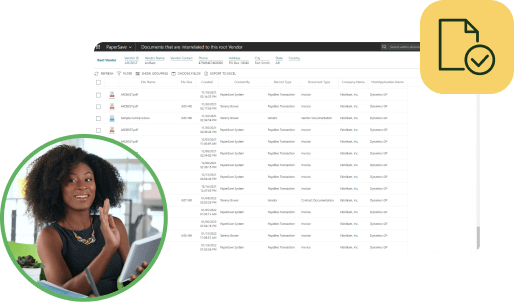
Wadih Pazos
Wadih founded both PairSoft and PaperSave. He is an avid technologist who specializes in streamlining operations and maximizing productivity.
View all posts by Wadih PazosWadih Pazos

Getting rid of the tangible files can be a big relief for the business in numerous ways, making the office more productive and successful in terms of saving money. However, administrators have to be very careful about destroying the original copies. While a lot of the best electronic document management software is well-equipped to ensure the company remains compliant when storing and recording important records, businesses have to be cautious about other factors when getting rid of tangible records.
This has led many company leaders to question when, if at all, they should get rid of hard copies. The answer is that they definitely should – otherwise, many of the benefits of going digital won’t be enjoyed. However, the when aspect is going to be different for everyone.
Perhaps the easiest thing to do in many cases is to shred such documents immediately after they are placed online using paperless software. This way, workers avoid placing the same record on the platform numerous times, which is a waste of time and space and can prove very confusing in the long run.
However, it’s very important to make sure the entire record makes its way to the digital sphere before the paper is destroyed. After all, because companies need to shred files, once it’s gone, it will be exceedingly hard, if not impossible, to get it back.
Outright Bookkeeping reported that there are certain files that business leaders might want to hang onto forever, though in many cases, that’s not necessarily mandatory. For instance, the website explained that many people feel more at ease if papers like titles and deeds, as well as rental agreements or even some contracts, are hung on to forever.
That being said, the news source stressed that IRS files are no longer required to be in paper form. As such, putting old tax files and other similar forms online might be easier, making them more manageable.
According to Outright Bookkeeping, because the IRS has the right to audit an individual or business for five years after tax returns are filed, many people like to keep hard copies of their financial files. However, that’s not necessary anymore. In fact, because so much of the digitization software is guaranteed to be compliant with federal and state tax laws, company administrators simply need to make sure they’re using worthwhile programs.
If they’re audited, this can be done via office computers. In fact, this option might be much more attractive – such audits would be much easier, because individual files in question could be brought up with just a few keystrokes. Moreover, these inquiries would be faster, meaning that company workers could get back to their normal tasks quicker, thereby ensuring the business remains efficient and productive.
Ultimately, it’s up to company leaders to decide when they’re comfortable with shredding documents – there’s no right or wrong answer. One of the nice things about digitizing is that you can do every aspect on your own time.
Automated workflows empower your team to focus on larger, more complex initiatives without having to think about small processes.


Many organizations start with manual receipt handling, fragmented card feeds and slow AP processes. Implement AI agents to auto-capture receipts, route approvals, enable punch-out buys and post to the ERP.
Result: faster batching, fewer errors and cost savings. “This saves us hours every month.”
Many organizations face slow, paper-heavy AP and fragmented procurement that waste time and inflate costs. AI Agents can automate approvals, PO matching and record sync to improve speed, accuracy and control. Client quote: “It freed up hours and made our process reliable.”
Operational drag and rising costs slow growth: teams waste time on manual tasks, misaligned priorities and opaque processes. AI Agents help automate routine work and coordinate actions across teams. “We’ve lost time to repeats and handoffs,” says a typical client.
Companies struggle with manual procurement, fragmented approvals, and costly integrations that slow growth and obscure spend. Our AI Agents streamline requisitions, POs, and invoice matching to cut manual work and improve visibility. “We were wasting time and missing insights,” says a client.

Many teams start with fragmented PO/AP systems, manual matching and delayed financial reporting. Deploying AI agents to automate PO checks, real-time encumbrance tracking and invoice matching reduces processing time and errors, delivering live budgets and faster closes. “Finally, we can see current balances and approve instantly.”
Many companies juggle growing invoice volumes and legacy systems. They struggle with manual processes, compliance gaps and limited headcount. Our AI Agents automate integrations, enforce rules and surface exceptions. The typical outcome: faster closes and measurable ROI. “We stopped chasing invoices.”